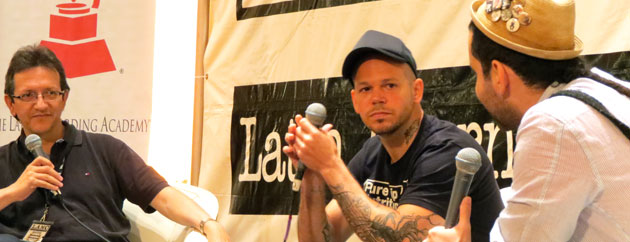
Calle 13 on music as language; Latin America as muse
18 July, 2012One of the biggest draws at the 13th Annual Latin Alternative Music Awards (LAMC) was Puerto Rican “alternative rap” superstars, Calle 13. And it was refreshing to see the 19-time Latin Grammy Award winners discuss how all of Latin America is a muse when creating their ever-evolving music.
The folkloric sounds heard in songs such as “La Cumbia de los Aburridos” aren’t a gimmick; explained Eduardo José Cabra Martínez, better known as Visitante, the man behind the music of Calle 13.
“We don’t like to repeat ourselves, whether it’s topics, beats or rhythms, so I’m constantly searching for new sounds,” he said. “I study it; I don’t use it without knowing why I’m using it.”
Calle 13 discussed their music and the themes behind it at a Q&A with Latin Recording Academy president Gabriel Abaroa on July 12 at the New Yorker Hotel, home base for this year’s LAMC.
René “Residente” Pérez Joglar said the band doesn’t simply swing through Latin American countries while touring. They make it a point to get out into the smaller communities, where they are often inspired by locals, such as mythical Colombian musicians, Los Gaiteros de San Jacinto. Calle 13 were so taken by the legendary folkloric group that they helped arrange visas and passports for a couple of them along with members from an indigenous tribe local to the Gaiteros’ hometown in northern Colombia just so they could perform alongside them at the 2007 Latin Grammy Awards held in Las Vegas.
“This was the first time they ever left their village,” Pérez Joglar recalled. “It was quite something.”
The track, “Baile de los Pobres,” Pérez Joglar said, was written as they visited a poverty-stricken village in Mexico that sat a stone’s throw away from a very wealthy one.
And Amantaní, a tiny island in the middle of Peru’s Lake Titicaca, was a place where Pérez Joglar said he witnessed what really counted as true wealth.
“Below in the valley, were community houses that the residents shared. It’s almost as if they rotated through these homes, all smiles, happily sharing everything,” Pérez Joglar said. “Yet just above, there are those who die searching for gold. They lived as if they hated each other. The contrast of that was something I took when writing lyrics at that time.”
It seems Calle 13 cannot be interviewed without being asked about politics, no surprise since they often push boundaries with their lyrics, chock full of double meanings.
“People like to classify us as a political band. That is just one aspect of our music. We also sing about sex and la fiesta,” Pérez Joglar said. “Lots of artists will infuse politics into their mediums, take a painter who may have lived through a war. Why not music?”
However Pérez Joglar was quick to admit he is politically critical in his lyrics when rhyming about his own country. He has written about the independence of Puerto Rico, which he is in favor of, and insulted the governor of the island.
“But in other countries, my job is to be socially critical, but not directly about their politics, because I don’t buy eggs, milk and bread there,” he said.
A recent example of his social criticism through lyrics would be his guest rhyme on “Todos Somos Ilegales,” a human rights anthem by political rockers Outernational, where Pérez Joglar challenges U.S. immigration and the constant debate surrounding it.
As he told Rolling Stone:
“I respect that North American musicians wanted to touch on that topic,” … adding that “even though they were creative monsters working on the track, I was like, ‘Whatever – I like the hook and I’m going to do something with this.’ I [recorded] it in one night.”
It is clear Calle 13 has no plans of slowing down or getting stagnant with their music. In fact, Pérez Joglar discussed his recent decision to move to New York City, where he plans to study English, French and Portuguese so he can make music in those languages.
“Trying to write in English is tough,” he said. “But music is a language in itself.”
Follow Sounds and Colours: Facebook / Twitter / Instagram / Mixcloud / Soundcloud / Bandcamp
Subscribe to the Sounds and Colours Newsletter for regular updates, news and competitions bringing the best of Latin American culture direct to your Inbox.

